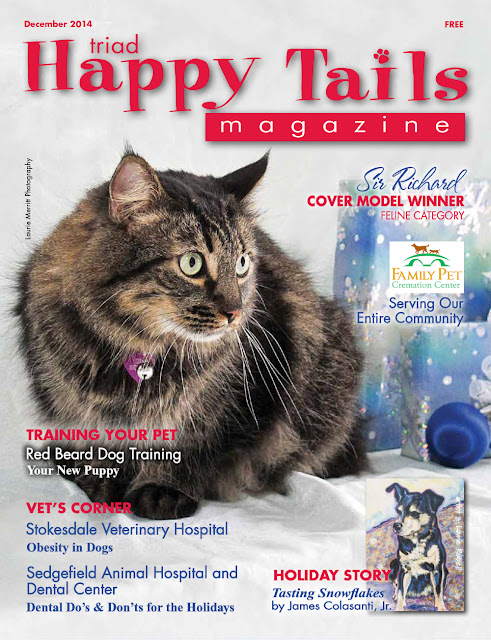The Companion Animal Parasite Council recommends we check our pet’s stool twice yearly by microscopic examination for evidence of intestinal parasites. Below are listed some of the common intestinal parasites we see, how your house pet may pick them up and a few key points about why it is important. Lastly there are a few tips for minimizing your pet’s risk.
Roundworms: These are seen in even the most well cared for of pets because their larvae are very hardy and can remain infective for years in the environment. Pets pick these up from infected dirt or eating a host such as a bird, rodent or even earthworms. Think about how often your dog may come in with dirty paws from its potty break and lick its paws to get them clean, play with a cute puppy while taking a walk in the neighborhood, or even try to chew on your hiking shoes from over the weekend. Has your cat ever groomed the dog that goes outside, played in a pot of flowers inside, or much less had a serious bug hunting episode in your house or up the curtains! These are very normal, ‘clean’ activities our house pets do, but can be an opportunity for them to pick up those microscopic parasite eggs and larvae.
Roundworms cause the most severe problems in our puppies and kittens but even adult pets can suffer irritation of the intestine and stomach with occasional diarrhea or vomiting. This parasite is of high interest for families with children because it is transmissible if children put contaminated dirt or objects in their mouth. The larvae can travel not only in the intestines, but can also move through other organs such as the liver, lungs and eyes causing permanent damage and even death if they damage the nervous system. Google ‘ocular larval migrans’ and you can understand the importance of keeping this in mind as a public health concern and keeping your pet parasite-free for your kids’ sake.
Whipworms: These also remain infective for years in the environment. In a recent study 10% of dogs that presented to a veterinary teaching hospital tested positive for these worms, as well as over 14% of shelter dogs. Often, infestations don’t cause symptoms but some animals experience bloody diarrhea, weight loss, anemia, dehydration and death.
Hookworms: Also spread from ingestion of larvae from a contaminated environment or host (such as a cockroach!) or penetration of the skin. Sometimes irritation is seen on the paws especially between the toes. These larvae only last in the soil for a few months, however, if your pet becomes infested the adults may live in their intestine for 4-24 months! In the intestines, the parasite creates small bleeding ulcers where they feed. Gardeners and children who play in areas where pets defecate are at risk of being infected, usually by penetration of the skin. In most people, the worm migrates within the skin causing severe itching and lesions, though we can also get infections in our intestines like dogs if the contaminated material is accidentally ingested or the larvae migrate.
Tapeworms: We commonly see tapeworms in our pets after they have had fleas since they act as hosts. Tapeworms can also be picked up by eating other animals’ fecal material, lice or an infected rodent. Children can pick up this parasite from ingesting an infected flea causing a mild diarrhea. Cats are such fastidious groomers that they often bite and eat a flea before we even are aware of a flea problem in a home or screened in porch, etc. The hunters cats are, can also put them at risk of catching a mouse that may have entered your home through a small opening without you even knowing (mice can enter in spaces as small as a quarter!).
Other parasites seen in fecal tests: There are other common parasites we pick up on fecal exams such as giardia and coccidia. Most giardia of pets is not thought to be transmissible to people as is the species typically coccidia puppies and kittens often carry, but toxoplasma gondii is a very important type of coccidia of cats that can be transmitted to people. Toxoplasma gondii causes significant inflammation and can cause birth defects in developing fetuses. If pregnant women are going to be cleaning a cat’s litter box, it is important to clean it at least every 24 hours, before the organism reaches its infective stage.
So between the stool checks your pet receives to deworm for any specific parasites they may have picked up by killing that bug in your house or playing in the yard, here are a few tips to minimize them from getting an infestation.
- Pick up the feces from your yard daily before it contaminates the soil
- Wash any raw fruits/veggies you may feed
- Don’t let your pet drink out of standing or run off water.
- Keeping your cats indoors certainly decreases the risk of picking up parasites from hunting (though as pointed out there are still windows of opportunity for indoor kitties too).
- Check with your veterinarian before putting your pet on a raw meat diet.
- Keep little ones safe by keeping sandboxes covered.
- Try to have separate areas of the yard where the children can play that the dogs are not contaminating.
- Follow leash laws and clean up after your pet to keep everyone safer.
Information pulled from Companion Animal Parasite Council.
This article was written by Madison Clonginger, DVM of Plaza Veterinary Hospital. Contact Plaza Veterinary Hospital for more information about this article or any other questions you may have about your pet by visiting: http://plazavethospital.com




